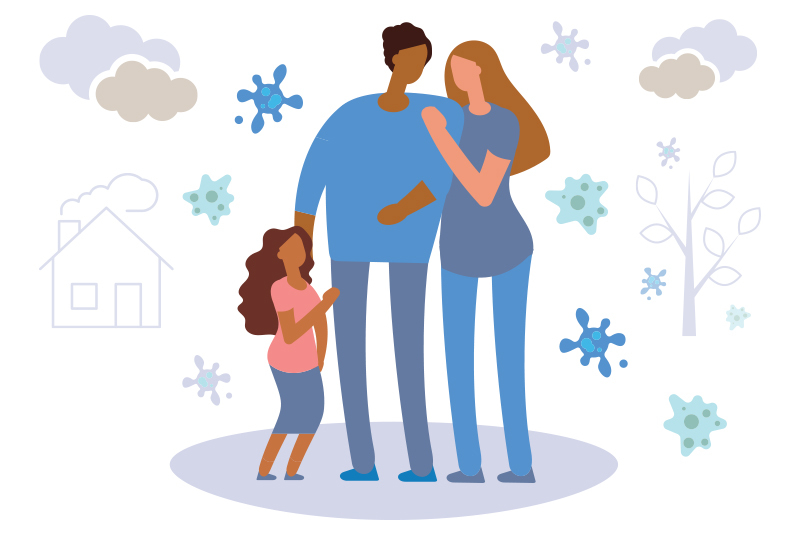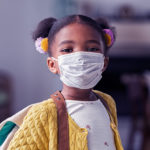Covid variants 101: What parents should know

First came Alpha, then Beta. It’s all about Delta right now, but Mu is already making headlines. You almost can’t keep track of COVID-19 variants without a scorecard. And as a parent striving to protect your family, this seemingly endless parade of variants may have you concerned about what’s next.
We asked three infectious disease specialists at Boston Children’s Hospital what COVID variants are all about and what you should expect.
What is a coronavirus variant?
The Centers for Disease Control and Prevention (CDC) compares the evolution of the coronavirus that causes COVID-19 to that of a tree. Just as a tree’s branches each differ slightly as they grow, so, too, does a virus as it spreads among people.
“Like any infectious agent, as the virus infects people and replicates, the virus’ genetic material can evolve,” explains Dr. Ofer Levy, director of Boston Children’s Precision Vaccines Program. “Many of these changes are irrelevant; some changes make the virus weaker. Unfortunately, some changes make the virus more problematic: either easier to spread or potentially more pathogenic, disease causing.”
Why are the variants named with Greek letters?
So that you remember them. With the world paying close attention to COVID-19, the World Health Organization (WHO) offers a shorthand that sticks in the minds of the general public: variant names based on the Greek alphabet. Thus, the scientific B.1.1.7. is also Alpha; B.1.617.2 is Delta. “We still have the scientific nomenclature, but these are easier names to grasp,” says Dr. Rose Lee, an infectious disease physician at Boston Children’s. “Certainly, it can be helpful, like the naming of hurricanes.” The naming system also aims to avoid tying a variant to the country where it was discovered and creating negative stereotypes about cultures.
How can you keep track of each variant’s influence?
Dr. Melanie Dubois, a pediatric infectious disease specialist at Boston Children’s, recommends checking the CDC’s categorization of variants to put the relative seriousness of variants in perspective. There are four classes of SARS-CoV-2 variants in this classification system. The first class, variants being monitored (VBM), includes those variants that are being closely watched but do not pose significant or imminent risk to public health in the U.S. Alpha, Beta, and Gamma variants are now in this category due to reduced transmission nationally. The next class, variants of interest (VOIs), includes variants with genetic changes that are predicted to affect transmissibility and severity, but more epidemiological evidence is needed.
The next class, variants of concern (VOC), meet the criteria of VOIs, but have demonstrated increased transmissibility or virulence, or both. The Delta variant is currently classified as a VOC. Fortunately, Dr. Dubois says, none of the variants identified so far have been deemed to be the last class, variants of high consequence (VOHC), a level at which vaccines and therapeutics would not effectively protect and treat children and adults.
Could new variants cause serious illness in children?
Delta is now the predominant strain of COVID-19, detected in 99 percent of cases in the U.S. Because it is widespread, health experts have ample opportunity to study how it affects children. As two studies released by the CDC in September found, since Delta became the top strain, COVID-19 cases in children and adolescents have been increasing and adolescent hospitalization rates are highest among those who are not vaccinated.
But for emerging variants such as Mu, it’s too soon to predict how they will affect children, Dr. Lee says. “We don’t know which one will be a major player.” Usually, scientists don’t initially know much about emerging coronavirus variants, but if another variant breaks through and becomes a VOI, she says, a vaccine will probably be able to protect against it.
Should you worry about the new variants?
Above all, our specialists urge you to avoid stressing over each new variant. The pandemic has already been stressful enough. “You don’t need to become anxious over every new variant,” Dr. Levy says. “The good news is the CDC is keeping an eye on it, via surveillance, and thankfully the vaccines are protecting against COVID-related hospitalization and death.” Aside from all eligible family members getting vaccinated, the specialists recommend that parents follow local public health guidance to protect themselves and their children: wear masks when required in public indoor spaces, practice social distancing when possible, and wash their hands thoroughly and often.
But that’s not all. With the pandemic continuing for the foreseeable future and adding to the challenges of parenting, Dr. Dubois advocates “living in the present as much as you can and practicing mindfulness.” If you do want to learn more about the latest developments, be aware of the source. The CDC and your local health department are credible sources, she says. “Be open minded and know scientists are doing their best. It’s still a new disease and we still need to learn more about it.”
Get more answers about COVID-19.
Related Posts :
-

Is the Delta variant worse for kids? Answers to your questions
As kids across the country return to in-person school, the COVID-19 pandemic looks a bit different from last year. Children ...
-

Losing a parent or caregiver to COVID-19: Advice for families
Ed. note: This story was updated on October 7 with new data on COVID-19 deaths. A recent international study estimated that ...
-

Navigating friendships and vaccines
With kids finally back at school and other activities after more than a year, many families now find themselves facing ...
-

Taming reentry anxiety: How to prepare kids for a back-to-school like no other
After more than a year and a half of remote, hybrid, and home-schooling, it’s time to gear up for ...





